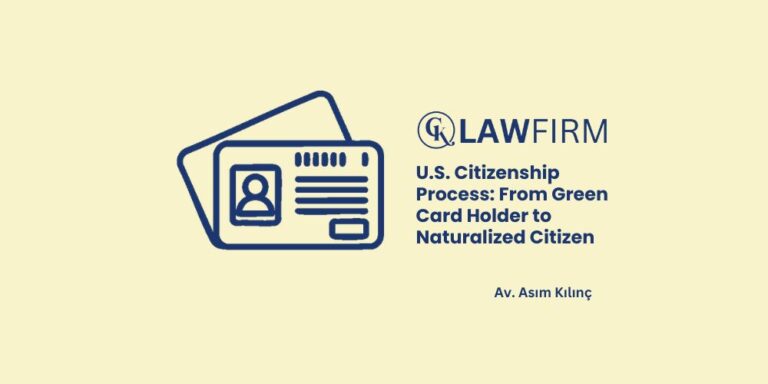Schedule an Appointment with Our Attorneys Now

Complete Guide to Form I-131F
Learn about Form I-131F, its filing process, required documents, and next steps. Discover how it helps noncitizen spouses and stepchildren.
Asım Kılınç, Immigration Lawyer, CK Law Firm | Content Editor Abdullah Çelik
When you read this article, you will be able to find answers to the following questions about Form I-131F:
- What is Form I-131F?
- Who Can File Form I-131F?
- Which Documents Must be Filed with Form I-131F?
- What Is the Filing Fee for Form I-131F?
- Can I File Form I-131F with Another Form?
- What Should I Expect After I Submit Form I-131F?
- What Happens If My Application Is Denied?
- I Know I Need Legal Help, What Should I Do?
- Can I Travel Outside the U.S. While My Application is Pending or After Approval?
- Can I Work in the U.S. Under Parole in Place?
- What is the Relationship between Form I-131F and Form I-130, Petition for Alien Relative?
- What are the Effects of Form I-131F Approval on Adjustment of Status?
If you have any other questions about Form I-131F, please feel free to contact us via the comments section at the bottom of this article or on the CK Law Firm Immigration Lawyer Webpage.
What is Form I-131F?
Officially known as the “Application for Parole in Place for Certain Noncitizen Spouses and Stepchildren of U.S. Citizens,” Form I-131F is a significant part of immigration to the United States. Under the Citizenship and Immigration Services (USCIS) “Keeping Families Together” program, some noncitizen spouses and stepchildren of U.S. citizens may apply for parole in place (PIP), allowing them to remain in the United States while they pursue lawful permanent resident status. For those who are in the United States without lawful admission or parole, this form is especially crucial since it offers a path to regularizing their status without having to leave the country, which can often be a difficult and complicated process.
Parole in place (PIP) is a discretionary action by the Department of Homeland Security (DHS) that allows noncitizens who are in the U.S. illegally to temporarily stay in the country. Given they satisfy all other eligibility criteria, this status helps them avoid deportation and provides a legal basis for them to apply for a green card through adjustment of status.
Who is Eligible to File Form I-131F?
Eligibility to file Form I-131F is especially restricted to certain groups of noncitizens with close ties to U.S. citizens. Here is a comprehensive list of those who might qualify:
Noncitizen Spouse of a U.S. Citizen
- Here, you can find information about fulfilling the requirements as a noncitizen spouse of a U.S. citizen.
- Physical and Continuous Presence: You must be physically present in the U.S. without having been paroled or lawfully admitted. You either overstayed your visa or entered the country without undergoing official immigration processing. From at least June 17, 2014, through the date you submit your application, you must have been continuously physically present in the United States. Being continuously present shows your long-term ties to the United States.
- Marriage: Your marriage must take place on or before June 17, 2024, and you have to be legally married to a U.S. citizen. The marriage needs to be legitimate and not motivated solely by immigration.
- Criminal History: You should not be seen as a threat to public safety, border security, or national security, nor have a notable criminal past. Disqualifying offenses include most drug offenses, sexual assault, domestic violence, and murder.
Noncitizen Stepchild of a U.S. Citizen
- To be eligible to file Form I-131F as a noncitizen stepchild of a U.S. citizen, you need to prove:
- Physical and Continuous Presence: Like the spouse requirements, you must be physically present in the United States without lawful admission or parole. From at least June 17, 2024, through the date of your application, you must have been continuously physically present in the United States.
- Parental Marriage: Before your 18th birthday and on or before June 17, 2024, your noncitizen parent must have been legally married to a U.S. citizen. This clarifies the stepchild relationship.
- Marital Status: To fit under this category, you must have been unmarried as of June 17, 2024, and under the age of twenty-one.
- Criminal History: Any notable criminal history could prevent you from being granted parole in place, similar to the category for spouses.
Which Documents Need to Be Filed with Form I-131F?
Gathering and submitting the right supporting documentation is crucial when preparing to submit Form I-131F. These records help to prove your eligibility for parole in place. Here is a comprehensive list of the records you will need:
Proof of Identity
- Remind you that expired documents can be filed alongside other supporting documentation and that if any of your papers are not in English, you must include a certified translation of the entire document into English before outlining how you prove your identity.
- Valid Government-Issued Driver’s License or ID: This should be a formal government document, such as a state ID card or driver’s license. It must clearly display your name, picture, and birthdate.
- Your Passport’s Identity Page: This page, which comprises your name, picture, passport number, and other personal information, serves as the main source of identity confirmation.
- National ID Card from Your Home Country: If you have a national ID card from your country of birth, you should send a copy. This sheet should have your picture and personal information.
- School ID Card with Photo: For candidates still in school, a school ID card with your photo can be submitted as additional proof of identity.
Proof of Either Spouse’s or Stepparent’s U.S. Citizenship
- U.S. Birth Certificate: If your stepparent or spouse was born in the United States, a copy of their birth certificate will prove citizenship.
- Naturalization Certificate: If your spouse or stepparent naturalized as a U.S. citizen, you should present a copy of their naturalization certificate.
- Certificate of Citizenship: Those who obtained or derived citizenship from their parents are issued this certificate. One copy will be sufficient evidence of citizenship.
- U.S. Passport: A current or expired U.S. passport is also acceptable evidence of citizenship.
Proof of Relationship
- Marriage Certificate: You have to hand in a certified copy of your marriage certificate, which attests to the legal recognition of your marriage.
- Documentation of Termination of Previous Marriages: If either partner had a previous marriage, you have to present death certificates, divorce decrees, or annulment orders proving that all previous marriages were legally ended.
- Birth Certificate: To prove the parental relationship for stepchildren, a birth certificate that includes the name of the noncitizen parent is required.
- U.S. Death Certificate: If your U.S. citizen spouse or stepparent died, you must provide a death certificate as evidence.
Evidence of Ongoing Physical Presence
- You should provide a combination of the following records to show your ongoing physical presence in the United States:
- Utility Bills or Rent Receipts: These can prove that you have lived at a given U.S. address consistently.
- IRS Tax Transcripts or Copies of Recently Filed Tax Returns: These provide proof of your ongoing presence.
- School Records: If you have children enrolled in school, their records will show your presence in the U.S. over time.
- Medical Records: Including doctor’s visits and vaccination records, these allow one to show ongoing presence.
- Participation in Religious Events or Consistent Attendance at a Place of Worship: These will help to prove your ongoing presence in the United States.
Evidence of Criminal History, if relevant
- If you have a criminal record, you must provide:
- Court-Certified Copies of Criminal Records: These include arrest records, charging documents, and final court rulings.
- Official Statement from Arresting Agency: If you were arrested but not charged, you should get a statement from the arresting agency attesting that no charges were filed.
- Documentation of Vacated or Expunged Convictions: If you had a conviction revoked, expunged, or sealed, you should provide pertinent court orders or statements verifying this.
More Evidence (if relevant)
- Documentation Supporting Urgent Humanitarian Reasons or Significant Public Benefit: This could include proof of community ties, vulnerability resulting from age or illness, or the effects of your deportation on U.S. citizen family members.
- Personal Statement: A 750 to 2000-word personal statement outlining your circumstances and the reason you are seeking parole in place. This is your chance to provide any unusual situation or difficulty USCIS should take into account while reviewing your application.
How Much Does Filing Form I-131F Cost?
Form I-131F carries a $580 filing fee. This form does not offer a fee waiver, so you should be prepared to pay this amount when you apply. The form can only be submitted online via the USCIS website. Any attempt at a paper application will be denied, and you will lose the filing fee.
Can I File Form I-131F Alongside Another Form?
No, Form I-131F cannot be filed concurrently with Form I-765, Application for Employment Authorization. USCIS mandates waiting for the approval of your Form I-131F before requesting work authorization. This means that even if you qualify for an Employment Authorization Document (EAD), you have to follow the parole in place procedure first and get a positive outcome before filing Form I-765.
After Submitting Form I-131F, What Should I Expect?
Several steps follow in the application process once you submit Form I-131F. You should expect:
- Receipt Notice: Your USCIS online account will show a receipt notice immediately upon submission of your form. This notice certifies that your application is under processing and has been received.
- Biometrics Appointment: Most applications will require attendance at a biometrics appointment. Your fingerprints, picture, and signature will be taken for background checks during this visit. You will be notified of your appointment along with the date, time, and location.
- Request for Evidence (RFE): If USCIS finds that further information or documentation is required to decide your case, they will send a Request for Evidence (RFE). Responding to an RFE quickly and completely is essential since neglecting to do so could cause your application to be denied.
- Interview: As part of the application process, USCIS could ask you to attend an interview. During the interview, a USCIS officer will probe your application, background, and motivations for seeking parole in place. Be ready to go into detail about every element of your case.
- Decision: Once USCIS has examined all required records and documentation, they will make a decision. Your USCIS online account will notify you of the ruling. If approval is granted, you will receive a Form I-797, Approval Notice, along with a copy of your Form I-94, Arrival/Departure Record, indicating the validity period of your parole in place.
What Happens If My Application Is Denied?
If your application for parole in place is denied, USCIS typically will not initiate removal actions based solely on the denial. However, if you are deemed a priority under current policies, DHS retains discretion to start immigration enforcement activities if you are considered a threat to national security, public safety, or border security.
Although you cannot appeal the denial of your Form I-131F, you could submit a fresh request including new or additional evidence along with the necessary filing fee. Review the reasons behind your denial carefully and address them in your next application to raise your chances of approval.
Knowing I Need Legal Help, What Should I Do?
The process of applying for parole in place can be complicated and difficult, particularly when considering issues like continuous physical presence, criminal history, and eligibility for adjustment of status. Consult an experienced immigration attorney whether you are considering submitting Form I-131F or have already filed and encountered problems.
An attorney can help you draft your application, ensure all required records are included, and represent you in any contacts with USCIS. Given the high stakes in immigration matters, professional legal advice can significantly affect the outcome of your case.
Can I Travel Outside of the United States? Either While My Application Is Pending or Following Approval?
Traveling outside the United States while your application is pending—or even after parole in place—can cause major problems. If you leave the United States after receiving parole in place, your parole will automatically end, and you might be denied re-entry. Parole in place does not grant travel permission. You would need an Advance Parole Document to travel, but even with this document, re-entry is not guaranteed. It is strongly advised to refrain from international travel during the parole process.
Could I Be Employed in the United States Under Parole in Place?
Indeed, if your request for parole in place is granted, you can apply under eligibility category (c)(11) for an Employment Authorization Document (EAD) by Form I-765, Application for Employment Authorization. You have to wait, though, until your Form I-131F is approved before submitting Form I-765. The filing fee for Form I-765 is $520 if filed on paper or $470 if filed online. Fee waivers for Form I-765 are available only if you file by mail.
How Do Form I-131F and Form I-130, Petition for Alien Relative, Relate?
Form I-130 is the petition a U.S. citizen spouse or stepparent files on behalf of a noncitizen spouse or stepchild to establish the family relationship needed for a green card application. Your U.S. citizen spouse or stepparent still must file Form I-130 even if you are granted parole in place to change your status to lawful permanent resident (LPR). Though they must be filed separately, Form I-130 can be filed before, during, or after the Form I-131F process.
The U.S. citizen stepparent must show for stepchildren that the marriage to the noncitizen parent was bona fide—that is, it was not entered into solely for immigration needs.
Regarding I-601A Provisional Unlawful Presence Waivers:
If you have accumulated unlawful presence in the United States, you might have to submit Form I-601A, Application for Provisional Unlawful Presence Waiver, to remove the bars to re-entry applicable upon leaving the country in order to obtain a visa. However, if you are granted parole under Form I-131F and subsequently seek to adjust your status (Form I-485), you will not have to leave the United States, and thus you might not need a provisional unlawful presence waiver.
You can still apply for parole in place if you have an approved or pending Form I-601A. However, if your Form I-131F is approved and you seek to adjust your status, your pending Form I-601A will be denied since it would not be required. To avoid any discrepancies, ensure all biographic data on Form I-131F matches the information on your Form I-601A.
What Effects on Status Adjustment Would Form I-131F Approval Have?
Approval of Form I-131F and the following grant of parole in place allows you to stay in the U.S. and possibly change your status to a lawful permanent resident (LPR). You must file Form I-485, Application to Register Permanent Residence or Adjust Status, to accomplish this. A grant of parole in place meets the criteria under INA 245(a), which state an applicant must have been inspected and admitted into the United States.
However, applying for a change of status will still be assessed for admissibility, including any unlawful presence you might have accumulated prior to the parole grant. If you were unlawfully present prior to parole in place, this could affect your eligibility for adjustment of status and require either waivers or other legal action.





